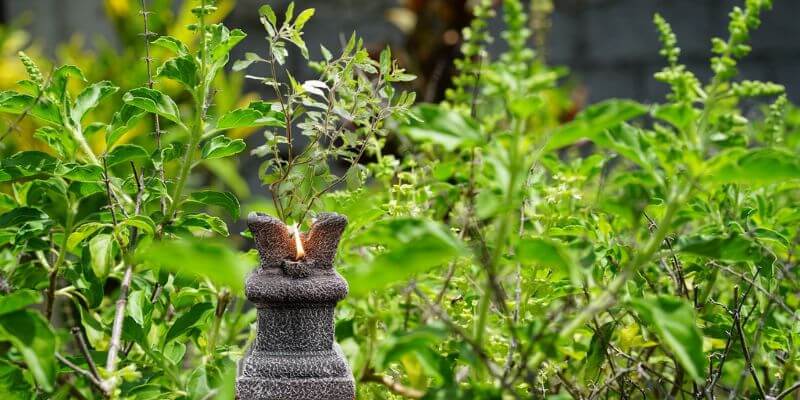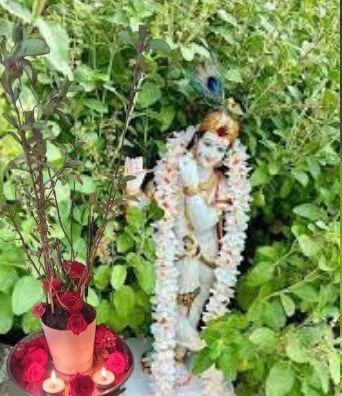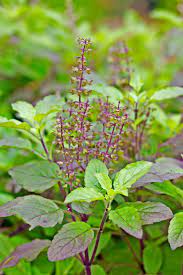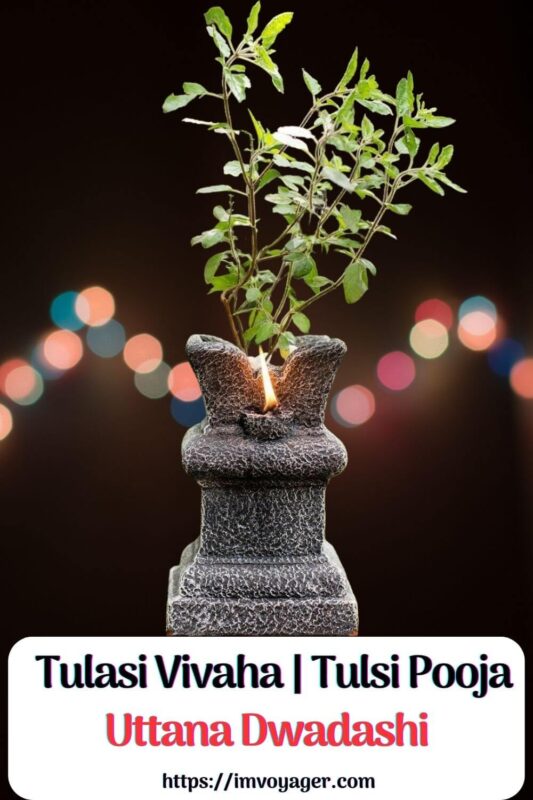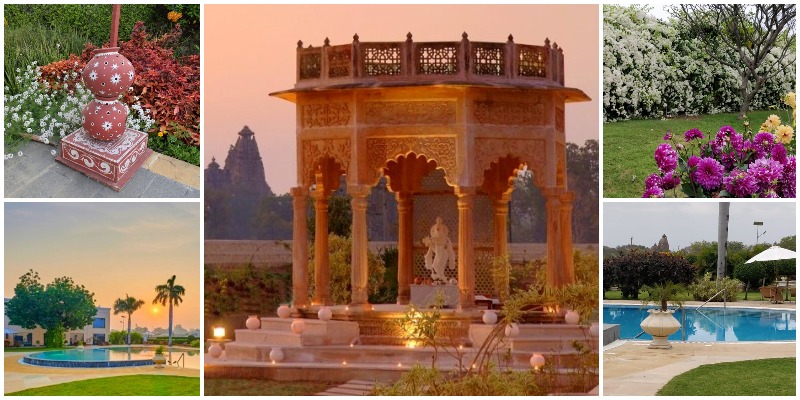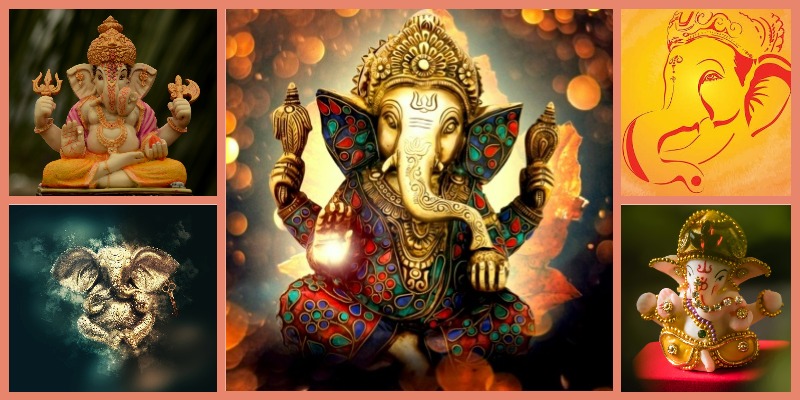Tulasi Vivaha is celebrated on the 12th day of the Shukla Paksha in the Hindu month of Kartik, which falls shortly after the Diwali festival. Tulsi Puja, specifically celebrated as Tulasi Vivaha, is a unique and cherished festival in India that signifies the divine marriage of the tulsi plant (holy basil) with Lord Vishnu. This ritual not only honors the sacred tulsi plant, which holds a prominent place in Hindu homes but also marks the official start of the Hindu wedding season. Known for its spiritual significance, this festival is believed to bring blessings of prosperity, harmony, and marital happiness. Celebrated with great enthusiasm across India, Tulsi Vivah reflects the enduring values of love, loyalty, and faith.
This post is all about Tulasi vivaha, from its legends and rituals to the various ways it is observed across different regions.
Table of Contents
Tulsi Puja Festival | Tulsi Pooja | Utvan Dwadashi
The Tulsi Puja Festival, or Tulasi Vivaha, is a joyous occasion celebrated with devotion and grandeur throughout India. This festival, which honours the marriage of the sacred tulsi (holy basil) plant to Lord Vishnu, is an important day in the Hindu calendar and marks the beginning of the wedding season. Observed on the Dwadashi (12th day) of the Shukla Paksha in the Hindu month of Kartik, Tulasi Vivaha falls right after Dev Uthani Ekadashi. This celebration represents faith and unity, as devotees gather in homes and temples to observe the symbolic wedding ceremony of Tulasi and Lord Vishnu. In many traditions, this festival is a custom cherished for the blessings it brings, believed to ensure marital happiness and family harmony.
During Tulsi Puja, festivities vary by region, with certain states marking the occasion with elaborate rituals and decorations:
- In Maharashtra and Gujarat, Tulasi Vivaha is celebrated in temples with vibrant decor, devotional music, and ritualistic fervour.
- In Uttar Pradesh and Rajasthan, families set up marriage mandaps for the tulsi plant at home, much like a traditional Hindu wedding, to signify the importance of Tulasi as a family member.
- In South India, particularly in Karnataka, Tamil Nadu, and Andhra Pradesh, this festival is celebrated with regional customs and grand celebrations and is also known as ‘Choti Diwali. ‘ Each state brings its own charm and spirituality to this sacred celebration, blending tradition and devotion to honour the symbolic union of Tulasi and Lord Vishnu.
Tulsi Vivah Story | Tulsi Vivah Katha
The story of Tulsi Vivaha is deeply rooted in Hindu mythology, where the tulsi plant embodies the virtues of loyalty, devotion, and faith. According to legend, Vrinda, a woman of great piety, was married to the demon king Jalandhar. Vrinda’s devotion shielded her husband from harm, making him invincible. When Jalandhar’s evil actions threatened to overpower the gods, Lord Vishnu intervened by assuming Jalandhar’s form and breaking Vrinda’s protective aura, ultimately leading to Jalandhar’s defeat. Heartbroken, Vrinda cursed Lord Vishnu but later transformed into the holy tulsi plant. To atone for his actions, Lord Vishnu promised to marry Vrinda in her form as the tulsi plant, and this divine union is honoured every year through the Tulasi Vivaha ritual.
Tulsi Puja | तुलसी पूजा
Tulsi Puja, part of the Tulsi Vivah festivities, brings a deeply spiritual experience to families as they honour Tulasi with the rituals of a wedding ceremony. Often taking place in the courtyard or front yard, where tulsi plants are traditionally grown, the tulsi plant is beautifully decorated as a bride. With a vibrant sari, jewellery, and a symbolic face adorned with a bindi, Tulasi represents Vrinda, the goddess and bride in this ceremony. Devotees believe that observing Tulsi Puja helps in inviting prosperity and happiness into the home.
During Tulsi Puja, the Tulasi Vivaha is conducted with rituals, chants, and the lighting of diyas, as devotees sing hymns celebrating this divine wedding. The symbolic marriage ceremony involves tying the tulsi plant to a shaligram stone (representing Lord Vishnu) with sacred threads and exchanging garlands, making it as joyous as any traditional wedding. The festival is an occasion to remind devotees of the values of loyalty, love, and faith, symbolized through Tulasi and Lord Vishnu.
How is Tulasi Vivaha Celebrated | तुलसी विवाह
The celebrations of Tulasi Vivaha vary by region but follow similar rituals in the spirit of a Hindu wedding. Families observe a fast on the day, preparing a marriage mandap decorated with flowers, lights, and rangoli for the Tulasi plant. As part of the preparations, the tulsi plant is bathed, adorned with garlands and jewellery, and dressed in a sari. The shaligram stone, symbolizing Lord Vishnu, is also dressed in a dhoti and placed alongside the tulsi plant. With mantras, chanting, and prayers, families tie a thread between the two, symbolizing their divine union.
In South India, Tulasi Vivaha is celebrated with even greater fervour. Known as Tulasi Habba in Karnataka, devotees gather in temples and homes, singing devotional songs and offering prasad. In Andhra Pradesh and Tamil Nadu, community events often include processions where idols of Tulasi and Lord Vishnu are adorned and carried through the streets. As part of the celebration, devotees share a traditional meal and offer prasadam, inviting family and friends to partake in the blessings of this sacred festival.
This festival is also known by various names in different regions, reflecting its cultural significance across India:
- Uttana Dwadashi: In North India, this name signifies the day on which the festival is celebrated as part of the post-monsoon rituals that follow the Diwali season.
- Tulasi Damodara Vivaha: In Maharashtra and Gujarat, it highlights the connection between Tulasi and Lord Vishnu (Damodara), celebrated as a union of devotion and blessings.
- Tulasi Habba | Utvan Dwadashi: In Karnataka, this name captures the festive atmosphere surrounding Tulasi Vivaha, where community gatherings are held, and the tulsi plant is honoured with joyous rituals and offerings.
This festival embodies the spirit of devotion, family, and faith, making it a festival that resonates across generations. This festival is cherished not only for its religious significance but also for the joy and togetherness it brings. Observing Tulsi Vivaha reminds us of the power of devotion, as Tulasi (Vrinda) symbolizes loyalty, sacrifice, and divine love. Celebrating this union with Lord Vishnu in homes and temples allows devotees to partake in the blessings believed to bring harmony and prosperity to families.
We hope this post has enriched your understanding of this unique festival. Are there special traditions or rituals you observe during Tulasi Vivaha? Do let us know in the comments section below! Please share this post with your friends and on your social media channels to spread the joy and meaning of this beautiful celebration.
Dive into a world of cultural discovery and travel inspiration by subscribing to our blog and newsletter, where we share everything from practical travel tips to enchanting stories that spark wanderlust. Our YouTube channel, Travel With Sandy & Vyjay, brings India’s diverse heritage and breathtaking landscapes directly to you, covering everything from destinations and stays to culture, cuisine, and more. Join us on YouTube and get ready to fuel your travel dreams!
Engage with us on social media — Facebook, Instagram, X (formerly Twitter), LinkedIn, and YouTube — and join vibrant conversations about culture, travel, and community. You are invited to join our WhatsApp community for interesting travel stories, cultural insights, and more. Together, let us celebrate the joy of discovery and build meaningful connections that last a lifetime!
We are a reader-supported site. This means, at no additional cost to you, we may earn a small commission if you book a flight or hotel, or make a purchase through one of our affiliate links. Thank you for your support!
Flights – Air India (Domestic) or Air India (International), or Priceline
Tours – Click to book top tours around the world. Book tours and activities here.
Experiences – Book your next unforgettable experience here, with flexible bookings and free cancellations. Reserve tours and activities now and pay later.
Hotels – Click to book the best hotels/resorts. Choose the best stay options with TripAdvisor or Hotels.com, or HotelsCombined
Travel Insurance – Click to book Travel Insurance that covers a range of travel insurance and safety services including medical emergencies, lost luggage, trip cancellation and more
Visas and Travel Documents Application – Click here for Online Travel Visa Check
Online Passport Photo – Get Your Passport Photo Online here
Do You Love Traveling?
Do you want to know how to travel the world? We have put together a very useful travel resources page with the best travel tips. Go check it out now. Thanks for visiting our site Voyager - imvoyager.com and taking the time to read this post! If you wish to collaborate/work with us then reach us at imvoyager18@gmail.com We’d love it if you’d comment by sharing your thoughts on this post and share this post on social media and with your friends. Follow our journey on our social media channels: Facebook X Instagram Pinterest YouTube
Start dreaming about your next adventure with Tripadvisor. Book your next unforgettable experience here with flexible bookings and free cancellations.
Flight booking online at the best fare
60+ Million Users Trust TripAdvisor With Their Travel Plans. Shouldn't You?

Sandy & Vyjay are a husband and wife duo who are travel content creators. They are co-founders of this travel website and are one of the leading travel content creators in India.
Sandy & Vyjay quit their successful corporate careers to pursue their passion for travel and writing full-time. Their dedication has earned them the “Best Travel Writer” award and numerous accolades on both national and international stages. Focusing on India’s destinations, heritage, and culture, they are passionate advocates for nature and the environment. Through their content, they promote ecotourism and sustainable travel, inspiring others to explore and preserve the beauty of India.

